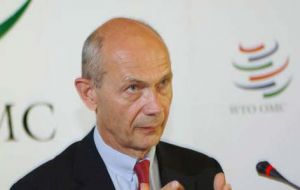MercoPress. South Atlantic News Agency
Trade talks failure, seen as death kiss for multilateralism
 “There's no use beating around the bush, this meeting has collapsed,” Mr Lamy said
“There's no use beating around the bush, this meeting has collapsed,” Mr Lamy said Marathon talks in Geneva aimed at liberalizing global trade have collapsed admitted the head of the World Trade Organisation Pascal Lamy. Officials have blamed China, India and the US for failing to agree on import rules.
EU Trade Commissioner Peter Mandelson said the result was "heartbreaking" and Brazil's Foreign Affairs minister Celso Amorim described the situation as "disappointing" and called for "another try". The talks were launched in 2001 in Doha and were seen as providing a cornerstone for future global trade. The main stumbling block was farm import rules, which allow countries to protect poor farmers by imposing a tariff on certain goods in the event of a drop in prices or a surge in imports. India, China and the US could not agree on the tariff threshold for such an event. Washington said that the "safeguard clause" protecting developing nations from unrestricted imports had been set too low. The negotiations floundered as trade officials gathered for a ninth day. "There's no use beating around the bush, this meeting has collapsed," Mr Lamy said. "Members have simply not been able to bridge their differences". He added that time was needed to determine "if and how" WTO members could end the stalemate. The Doha development round of trade talks initially started in 2001 with the aim of remedying inequality so that the developing world could benefit more from freer trade. However, the talks have repeatedly collapsed as developed countries failed to agree with developing nations on terms of access to each others' markets. The US and the European Union want greater access to provide services to fast-growing emerging countries, including China and India. Meanwhile, developing countries want greater access for their agricultural products in Europe and the US. Analysts have said that the collapse of the Doha talks could symbolize an end to multilateral trade agreements. Instead, nations may pursue dual agreements with partner nations, preferring to focus on their own requirements rather than a more common negotiating goal. The talks in Geneva were complicated by recent increases in the price of food and fuel. Higher prices have prompted protests in both developed and developing nations, making it harder for negotiators to reach a compromise on opening up their markets to greater competition, analysts said. Mr Mandelson, the EU trade commissioner, blamed the collapse on a "collective failure" but warned that the "consequences would not be equal", predicting that it would be countries that most needed help that would be hit hardest. "They [the consequences] will fall disproportionately on those who are most vulnerable in the global economy, those who needed the chances, the opportunities most from a successful trade round." he said. Trade officials had struck an optimistic tone on Friday, but this evaporated over the weekend amid acrimonious exchanges with the US accusing India and China of blocking progress. The US said they were being overly protective towards their own farmers and are failing to do enough to open their markets, with US trade representative Susan Schwab calling the stance "blatant protectionism". "In the face of the global food price crisis, it is ironic that the debate came down to how much and how fast could nations raise their barriers to imports of food" she said. But India's trade minister, Kamal Nath, who had been criticized by a number of countries for his intransigence said the US demands were unreasonable. "It's unfortunate in a development round we couldn't run the last mile because of an issue concerning livelihood security," Mr Nath said. WTO "should make another try" said Brazilian Foreign Affairs Minister Celso Amorim. "I am very disappointed that we were unable to finish the round; I would not have thought that everything would hinge on the special safeguard measures", added Amorim. Lamy's decision to call the summit was a gamble aimed at pressing key governments in the 153-member WTO to bridge divisions in a short period. He told negotiators last month that without an accord on agriculture and industrial goods by the end of July, the chances for a successful conclusion to the trade round were less than 50%.




Top Comments
Disclaimer & comment rulesCommenting for this story is now closed.
If you have a Facebook account, become a fan and comment on our Facebook Page!